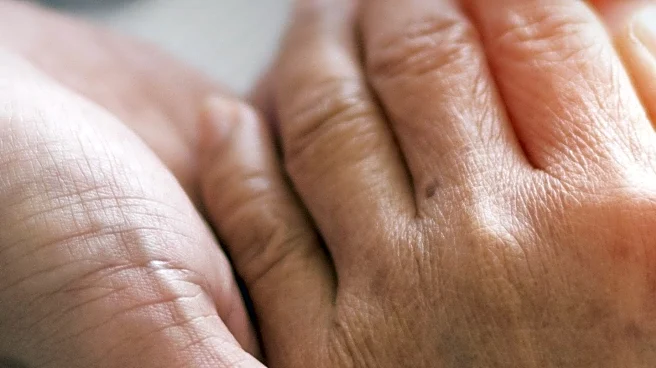What's Happening?
Hand and finger exercises have gained significant attention on social media platforms like TikTok and Instagram, with claims that they can help prevent dementia or Alzheimer’s disease. These exercises include
actions such as alternated clapping, tapping, arm circles, and pointing fingers in different directions. Despite their popularity, neurologist Dr. Chris Winter has expressed skepticism about the effectiveness of these exercises in preventing cognitive decline. While some studies suggest that hand exercises might improve aspects of mild cognitive impairment, Dr. Winter emphasizes that there is no magical effect from these movements. Instead, he suggests that the benefits come from the engagement and concentration involved in performing these exercises, which are part of a broader pattern of mental and physical activity.
Why It's Important?
The viral trend of hand exercises highlights a growing public interest in simple, accessible methods for maintaining cognitive health. However, the skepticism from medical professionals like Dr. Winter underscores the importance of evidence-based approaches to health and wellness. The broader implication is that while these exercises may be beneficial for practicing motor skills, they should not be seen as a standalone solution for preventing dementia. This situation reflects a larger societal challenge of discerning credible health advice from viral trends. It also emphasizes the need for individuals to engage in a variety of mental and physical activities, such as learning new skills or languages, to support cognitive health.
What's Next?
As the conversation around cognitive health continues, it is likely that more research will be conducted to explore the potential benefits of various exercises and activities. Health professionals may continue to advocate for a holistic approach to cognitive health, emphasizing regular exercise, quality sleep, a balanced diet, and mental and social engagement. The public may also become more discerning about health trends on social media, seeking advice from credible sources. Additionally, platforms like TikTok and Instagram might face increased scrutiny regarding the health information shared by users.
Beyond the Headlines
The trend of hand exercises for dementia prevention raises questions about the role of social media in disseminating health information. It highlights the potential for misinformation and the responsibility of both content creators and platforms to ensure that health advice is accurate and evidence-based. This situation also points to a cultural shift towards proactive health management, where individuals seek out simple, everyday practices to enhance their well-being. However, it also underscores the need for critical thinking and consultation with healthcare professionals when adopting new health practices.










